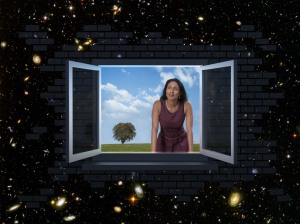I am a cosmologist. In my research, I am contributing to an international effort to understand the origin and the evolution of the Universe. It is amazing that this is even possible, because it involves extreme physics that we cannot replicate in the laboratory. However, at the Big Bang, the Universe itself performed the ultimate physics experiment. The clues to this physics are imprinted upon the oldest light we can see in the Universe, the so-called cosmic microwave background, and the large scale distribution of galaxies. Because the ultimate experiment was done once, and we can’t repeat it, cosmologists have to become detectives. Different theories of the universe produce different fingerprints in these data, and we sift through the fingerprints looking for which one matches what we observe. We are trying to piece together the clues to figure out the narrative about how our Universe began, and how it is evolving. In the past decade we have been able to precisely answer age-old questions such as how old is the Universe, what does it contain, and what is its destiny. Along with these answers have also come many exciting new questions.
Modern cosmological research is a very collaborative and international enterprise. My work involves a lot of mathematics and high performance computing, the development of advanced algorithms and highly specialized databases to store and sift through the massive amounts data returned by cosmological sky surveys. Some of this work requires me to work in small groups with two or three other researchers, but I also contribute to large global projects with several hundred people in many countries. Since cosmology is very international, I travel extensively, discussing research findings, giving talks, and running workshops and seminars. I also enjoy sharing my knowledge and enthusiasm with my undergraduate and postgraduate students at the university.
Young women today should consider choosing to study the sciences because scientific research is intellectually stimulating, fun, and enables a huge range of careers within and outside academia.
“Blue skies” research is extremely important for our society, and for humanity as a whole, because one can never predict where the next breakthrough is coming from. In addition, science students are trained to think independently and out of the box, and they are adept at using incomplete data to reach useful and robust conclusions. They are often excellent computer programmers. They have great communication and time management skills. For these reasons they are highly sought-after in industry, engineering and finance.
Professor Hiranya Peiris
Alumna (New Hall/Murray Edwards College)
Prof. Peiris is Professor of Astrophysics at University College London.

